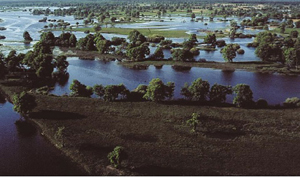
A £14,000 grant from the Wildlife Habitat Charitable Trust (WHCT) will help to restore natural floodplain on selected sites of the Pripyat River in Belarus. The river provides important stopover sites for migratory birds in Europe and key breeding grounds for rare and endangered species.
Changes in land use have had a negative impact on this important area and open floodplain meadows were becoming overgrown with shrubs and trees, making them unattractive to wildfowl. The grant from WHCT will help restore 500 hectares of open floodplain providing better habitat for important UK quarry species such as greylag geese, mallard, pintail, wigeon and teal.
The grant, which enabled the project team to secure an additional £17,500 from local authorities in Belarus, will also create demonstration sites and workshops for local people to explain the importance of the floodplain and how it can be managed in the future.
Tim Russell, secretary to the WHT said: “Migratory wildfowl face many challenges as they make their annual migrations to and from breeding grounds in arctic tundra and overwintering wetlands here in the UK. Conservation of migratory wildfowl is made more difficult by the changing climate, and there is increasing evidence that some birds are changing their migration patterns as a consequence. Conservation projects must therefore focus on important stopover sites like the Pripyat River, where wildfowl feed and rest during their journeys.”
Over the last five years trustees of the WHCT have made other grants totalling £30,000 to international projects. These include habitat restoration projects on stopover sites for migratory wildfowl in Lithuania and the Kaliningrad Region of Russia. These projects have proved extremely successful as they have improved the habitat significantly.
